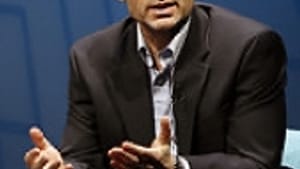Stay in the Loop
BSR publishes on a weekly schedule, with an email newsletter every Wednesday and Thursday morning. There’s no paywall, and subscribing is always free.
Is Neil LaBute beyond redemption?
Neil LaBute's "Break of Noon' in New York

How low will men go? Ask Neil LaBute. His plays like Fat Pig and The Mercy Seat and his movie, The Company of Men, among his many many other works, answer the question amply.
The latest addition to the Neil LaBute rogues gallery is John Smith, the self-centered center of the prolific playwright's new play, The Break of Noon. Smith is another in LaBute's self-absorbed, self-forgiving, self-indulgent fraternity of creeps. In this new drama, the creep finds God. And if God can forgive him, why can't we?
Who better to play this sleazoid than David Duchovny? His starring role in TV's porno-comedy series, "Californication," would seem to have been a long rehearsal for the role of John Smith.
Sole survivor
Break of Noon begins with a long monologue delivered by John Smith as the only survivor of an office massacre. An employee of the company ran amok and murdered 37 people, and Smith alone escaped to tell the tale. After describing the mayhem, he tells us (or some unseen listener) that a "beautiful deep clear voice" spoke to him, saying, "Stay here and you shall be saved." And he was. He says.
After this experience, Smith tries to convince people he is a changed man: first his lawyer (John Earl Jelks), then his ex-wife (Amanda Peet), then a TV talk show host (Tracee Chimo), then his mistress (Peet again), then a hired hooker (Tracee Chimo), then the police detective (Jelks again), then a group of people, his followers, his audience (us).
His mission is to spread the word, and that word is: "We should try to be good."
Nobody who meets Smith believes he is a changed man, partly because he was a violent, philandering gambler his whole life, and partly because he bullies every woman we see him with. Oh, one other tidbit: Smith took a cell phone photo of the massacre and sold it for $1 million. ("If they pay you for it," he explains, "it's God's will.")
Gimmick or miracle?
Because Duchovny's flat, overly earnest delivery provides us with nothing to go on, we can't tell if he's a fraud of a self-deceiver or the real deal. In a play about doubt, it could be argued that that is exactly what's needed. But that interesting argument falls apart when LaBute concludes Break of Noon with what is either a theatrical gimmick or a miracle— either of which could/should provoke a gasp of wonder.
This particular human did no such thing. Instead, faithful to LaBute's cynical view of human cynicism, she merely felt/thought, "What?!"
The latest addition to the Neil LaBute rogues gallery is John Smith, the self-centered center of the prolific playwright's new play, The Break of Noon. Smith is another in LaBute's self-absorbed, self-forgiving, self-indulgent fraternity of creeps. In this new drama, the creep finds God. And if God can forgive him, why can't we?
Who better to play this sleazoid than David Duchovny? His starring role in TV's porno-comedy series, "Californication," would seem to have been a long rehearsal for the role of John Smith.
Sole survivor
Break of Noon begins with a long monologue delivered by John Smith as the only survivor of an office massacre. An employee of the company ran amok and murdered 37 people, and Smith alone escaped to tell the tale. After describing the mayhem, he tells us (or some unseen listener) that a "beautiful deep clear voice" spoke to him, saying, "Stay here and you shall be saved." And he was. He says.
After this experience, Smith tries to convince people he is a changed man: first his lawyer (John Earl Jelks), then his ex-wife (Amanda Peet), then a TV talk show host (Tracee Chimo), then his mistress (Peet again), then a hired hooker (Tracee Chimo), then the police detective (Jelks again), then a group of people, his followers, his audience (us).
His mission is to spread the word, and that word is: "We should try to be good."
Nobody who meets Smith believes he is a changed man, partly because he was a violent, philandering gambler his whole life, and partly because he bullies every woman we see him with. Oh, one other tidbit: Smith took a cell phone photo of the massacre and sold it for $1 million. ("If they pay you for it," he explains, "it's God's will.")
Gimmick or miracle?
Because Duchovny's flat, overly earnest delivery provides us with nothing to go on, we can't tell if he's a fraud of a self-deceiver or the real deal. In a play about doubt, it could be argued that that is exactly what's needed. But that interesting argument falls apart when LaBute concludes Break of Noon with what is either a theatrical gimmick or a miracle— either of which could/should provoke a gasp of wonder.
This particular human did no such thing. Instead, faithful to LaBute's cynical view of human cynicism, she merely felt/thought, "What?!"
What, When, Where
The Break of Noon. By Neil LaBute; directed by Jo Bonney. Through December 22, 2010 at MCC Theater at Lucille Lortel Theatre, 121 Christopher St., New York. (212) 279-4200 or www.mcctheater.org.
Sign up for our newsletter
All of the week's new articles, all in one place. Sign up for the free weekly BSR newsletters, and don't miss a conversation.

 Toby Zinman
Toby Zinman